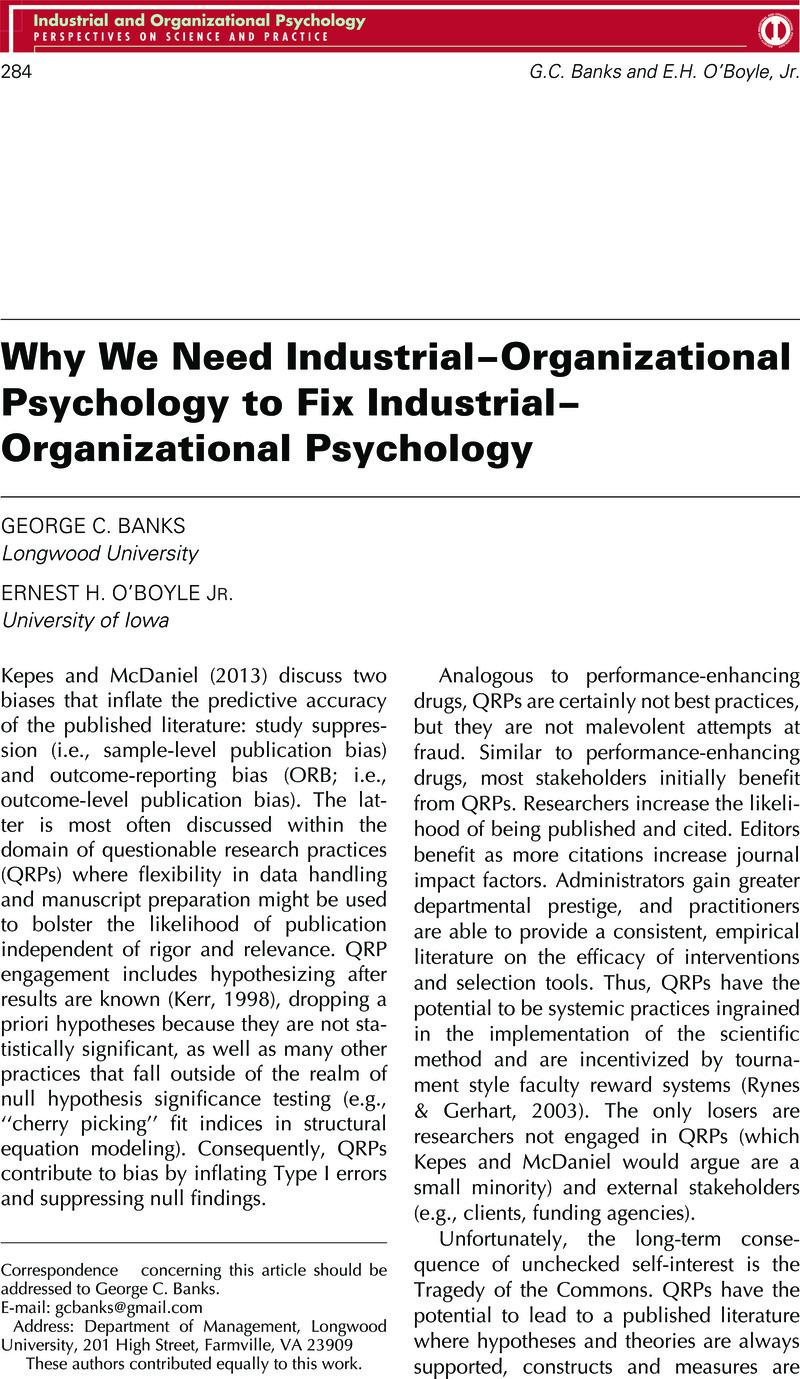Crossref Citations
This article has been cited by the following publications. This list is generated based on data provided by Crossref.
Banks, George C.
Rogelberg, Steven G.
Woznyj, Haley M.
Landis, Ronald S.
and
Rupp, Deborah E.
2016.
Editorial: Evidence on Questionable Research Practices: The Good, the Bad, and the Ugly.
Journal of Business and Psychology,
Vol. 31,
Issue. 3,
p.
323.
Banks, George C.
O’Boyle, Ernest H.
Pollack, Jeffrey M.
White, Charles D.
Batchelor, John H.
Whelpley, Christopher E.
Abston, Kristie A.
Bennett, Andrew A.
and
Adkins, Cheryl L.
2016.
Questions About Questionable Research Practices in the Field of Management.
Journal of Management,
Vol. 42,
Issue. 1,
p.
5.
O’Boyle, Ernest Hugh
Banks, George Christopher
and
Gonzalez-Mulé, Erik
2017.
The Chrysalis Effect.
Journal of Management,
Vol. 43,
Issue. 2,
p.
376.
Grand, James A.
Rogelberg, Steven G.
Allen, Tammy D.
Landis, Ronald S.
Reynolds, Douglas H.
Scott, John C.
Tonidandel, Scott
and
Truxillo, Donald M.
2018.
A Systems-Based Approach to Fostering Robust Science in Industrial-Organizational Psychology.
Industrial and Organizational Psychology,
Vol. 11,
Issue. 1,
p.
4.
Nielsen, Bo Bernhard
and
Raswant, Arpit
2018.
The selection, use, and reporting of control variables in international business research: A review and recommendations.
Journal of World Business,
Vol. 53,
Issue. 6,
p.
958.
Banks, George C.
Field, James G.
Oswald, Frederick L.
O’Boyle, Ernest H.
Landis, Ronald S.
Rupp, Deborah E.
and
Rogelberg, Steven G.
2019.
Answers to 18 Questions About Open Science Practices.
Journal of Business and Psychology,
Vol. 34,
Issue. 3,
p.
257.
Aytug, Zeynep G.
Rothstein, Hannah R.
Kern, Mary C.
and
Zhu, Zhu
2019.
Is There Social Consensus Regarding Researcher Conflicts of Interest?.
Ethics & Behavior,
Vol. 29,
Issue. 2,
p.
101.
Efendic, Emir
and
Van Zyl, Llewellyn E.
2019.
On reproducibility and replicability: Arguing for open science practices and methodological improvements at the South African Journal of Industrial Psychology.
SA Journal of Industrial Psychology,
Vol. 45,
Issue. ,
Bal, P. Matthijs
Dóci, Edina
Lub, Xander
Van Rossenberg, Yvonne G. T.
Nijs, Sanne
Achnak, Safâa
Briner, Rob B.
Brookes, Andy
Chudzikowski, Katharina
De Cooman, Rein
De Gieter, Sara
De Jong, Jeroen
De Jong, Simon B.
Dorenbosch, Luc
Ghoreishi Galugahi, Motahareh Alsadat
Hack-Polay, Dieu
Hofmans, Joeri
Hornung, Severin
Khuda, Kudrat
Klamer, Renze
Mendy, John
Mol, Stefan T.
Navarro, Jose
Notelaers, Guy
Ossenkop, Carolin
Pickett, Jennifer
Röllmann, Laura
Sanderson, Zoe
Sosnowska, Joanna
Spanouli, Andromachi
Vantilborgh, Tim
Van Dijk, Hans
and
Van Zelst, Marino
2019.
Manifesto for the future of work and organizational psychology.
European Journal of Work and Organizational Psychology,
Vol. 28,
Issue. 3,
p.
289.
Van Zyl, Llewellyn E.
2019.
Enhancing scientific credibility: An open science strategy for the South African Journal of Industrial Psychology.
SA Journal of Industrial Psychology,
Vol. 45,
Issue. ,
Neoh, Michelle Jin Yee
Carollo, Alessandro
Lee, Albert
and
Esposito, Gianluca
2023.
Fifty years of research on questionable research practises in science: quantitative analysis of co-citation patterns.
Royal Society Open Science,
Vol. 10,
Issue. 10,



